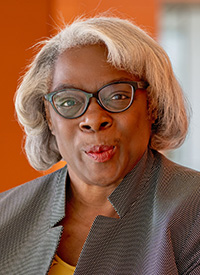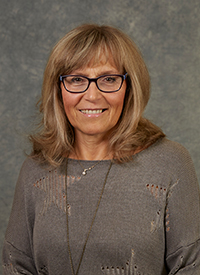
Who are Gen Z, and how can we understand them better? Two of our faculty members have recently published research providing insights into the mental health challenges facing this distinctive group and its political viewpoints. Now 20 percent of the American population, Gen Z individuals are a powerful voice for change.
Generation Z—those born between 1997 and 2012—are only preteens and young adults, but they’re already making a profound impact in the world.
A unique generation, and one of the most enigmatic, they were born into the digital age, grew up during a pandemic, and have led groundbreaking social justice movements.
To get at the heart of who Gen Zers really are, two Adelphi faculty members recently conducted research in their respective fields of psychology and social work. Kate Szymanski, PhD, associate professor in the Gordon F. Derner School of Psychology, dove deeply into the mental health challenges facing Gen Z. And Diann Cameron Kelly, PhD, associate provost for student success, researched the political attitudes of Gen Z in advance of the 2024 presidential election.
We interviewed Dr. Szymanski and Dr. Kelly to learn about their research and the insights they drew from it.
What was the motivation behind your research?

Diann Cameron Kelly, PhD, associate provost for student success
Dr. Kelly: My research is focused on civic engagement. I wanted to explore who this group really is. Gen Z is significantly social justice-minded. In 2020, when we were in lockdown, Gen Z and millennials were leading the movement for social justice reform, and they did it by word of mouth. It was really phenomenal what they achieved. Whether they’re on the right or the left, they’re committed to causes. They came out in 2020 for the presidential election, and it seems as though they will repeat that momentum in 2024. Who they will vote for is the question that’s up in the air.
Dr. Szymanski: My area of expertise is trauma and how it affects a wide range of age groups. What was striking to me was that there’s research on the correlation between interpersonal relationships and suicidality in adults, but not in children and adolescents. And I felt that this was particularly important since interpersonal relationships are crucial to children’s development. Using archival data from children’s mental health hospitals, I wanted to research possible risk factors and protective factors for mental health impairment and suicidality in young people, particularly those who’d experienced trauma.
What makes Gen Z unique from other generations?

Kate Szymanski, PhD, associate professor in the Gordon F. Derner School of Psychology
Dr. Szymanski: Gen Z has a higher experience of depression than older generations, so they have a higher risk of suicidality. That’s an alarming statistic. Gen Z also feels more disconnected and isolated than the previous generations. This is because of things like social media and COVID. This generation grew up with social media and, for them, it’s a very natural way of expressing themselves. So there’s a power in it to some extent, but there’s also a danger in it.
Dr. Kelly: When baby boomers were at this age in the late ’50s and ’60s, they had this apathy toward government. And when you look at Gen Z, they don’t have an apathy toward government—they have a call to action as to what government is supposed to do for its people. It’s a total divergence. They will also speak up for themselves, which older generations are not used to doing. If a Gen Zer has an issue at work, they will say to their boss, ‘This is not working for me. I need a change.” And they will expect a change. Some people would call that entitled, but I believe the right term is self-advocacy. They know how to advocate for themselves.
What did you learn from your research? Did anything surprise you?
Dr. Kelly: Gen Z is not lazy. They’re not coddled, even though we call them the coddled generation. They are really focused. They’re multitaskers. They grew up in the digital age and they survived a pandemic. So, to them, togetherness and connection have a different meaning. It’s not just about talking with someone. How close are you to that person? How does that person factor into your life? Meaning is very important to this generation.
Dr. Szymanski: We found that interpersonal dependency—or relying on others—can support mental health for boys, particularly when they are traumatized and distraught. That’s a pretty powerful finding. With girls, we found that interpersonal dependency can be a risk factor for their mental health. When they have a higher need for interpersonal dependency and they feel like their relationships are not satisfactory and they have trauma, they are more prone to suicidal thinking.
What does the future look like in Gen Z’s hands?
Dr. Kelly: When Gen Zers become captains of industry and CEOs, you’re going to see an aspect of business that prioritizes social engagement. Meaning, what is the purpose of business? How do I help the people that buy my products? What do I want to give to the community? I would say that it’s reminiscent of what John F. Kennedy said: “Ask not what your country can do for you, ask what you can do for your country.” I think that it’s emblematic of Gen Zers. They want to do for the country, and they will do it. Look at the current contributions of Gen Zer Congressman Maxwell Frost (D-FL). He assumed office in January 2023 and is the first Gen Zer to serve in Congress. He will not be the last.
How can other generations support Gen Z?
Dr. Szymanski: We do not acknowledge overtly that boys have a need for dependency. We ignore that need, and that is a dangerous stance to take. On the other hand, when girls communicate dependency and they are in trouble, we just assume that they generally rely more on others, and we might miss or minimize those signals. So, for boys, we need to acknowledge that need for dependency, and for girls we need to be more attuned and not dismiss it.
Dr. Kelly: We haven’t seen the full picture from Gen Z. The youngest Gen Zer is 11 years old right now. We have not seen them really produce work. We have not seen them as married people. We have not seen what they’ll do as parents. There’s so much that is unknown, and all we have to do is just allow them to grow and develop into the people that they choose to be.